人教版高一英语必修二unit5 Music全套课件(115张PPT)
文档属性
| 名称 | 人教版高一英语必修二unit5 Music全套课件(115张PPT) |

|
|
| 格式 | zip | ||
| 文件大小 | 19.6MB | ||
| 资源类型 | 教案 | ||
| 版本资源 | 人教版(新课程标准) | ||
| 科目 | 英语 | ||
| 更新时间 | 2019-11-04 00:00:00 | ||
图片预览


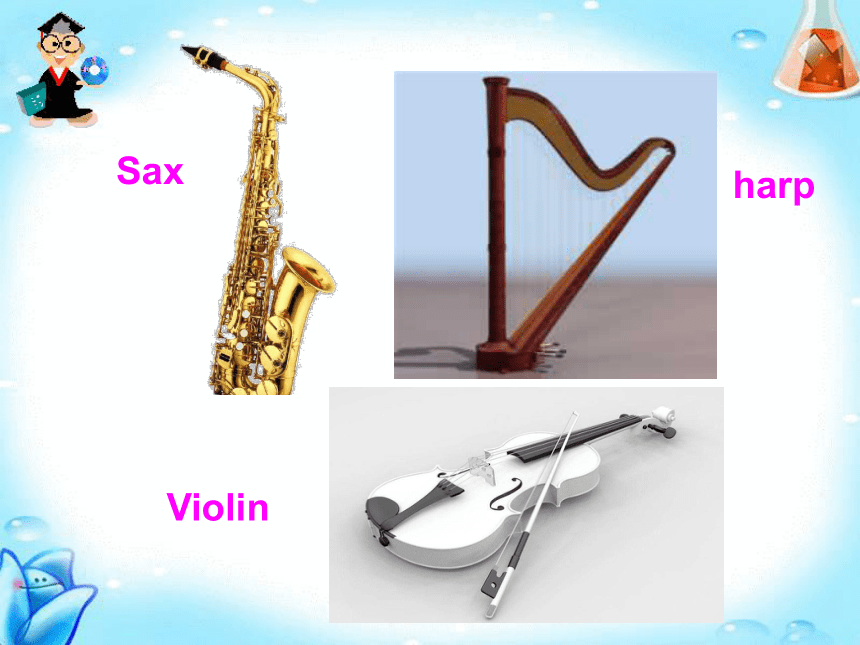
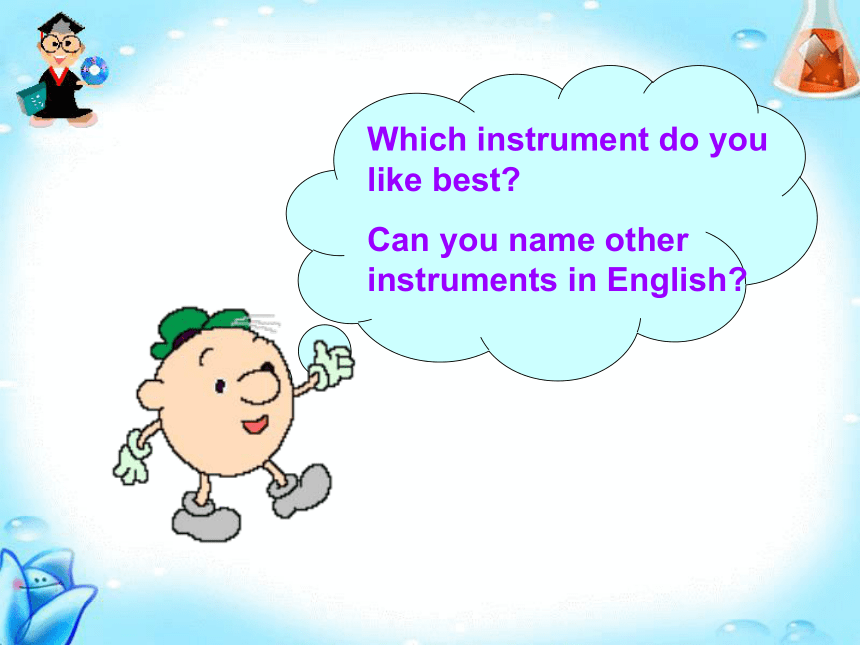
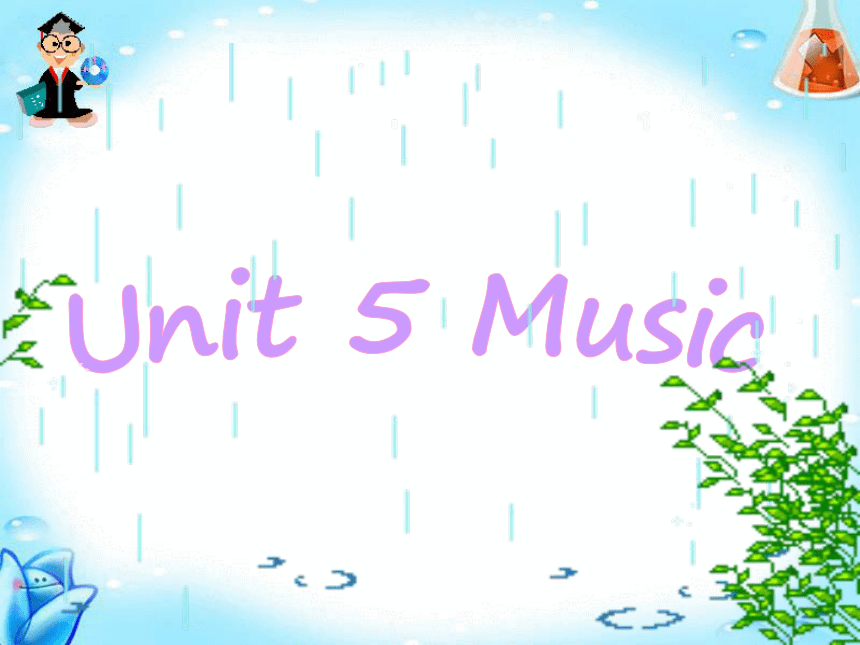
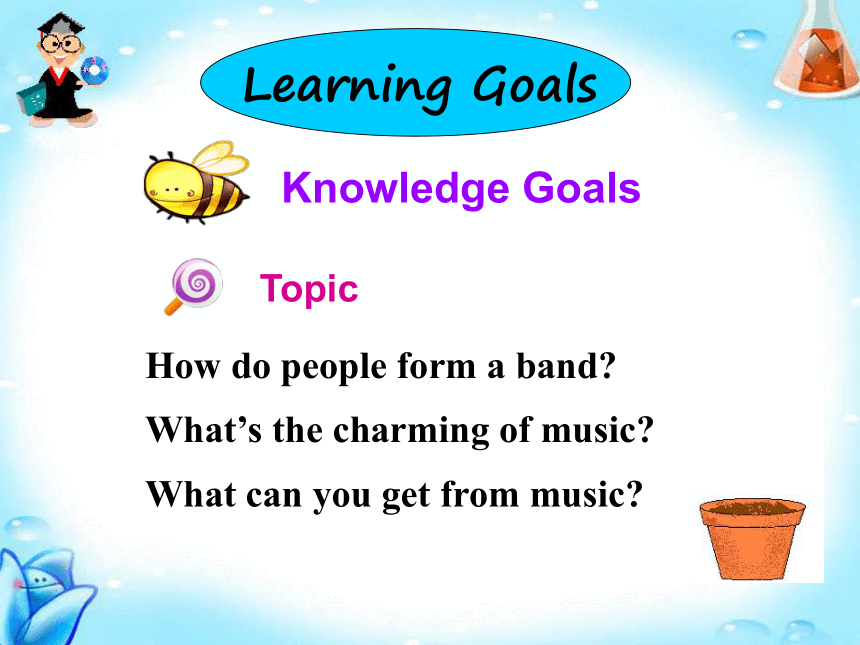
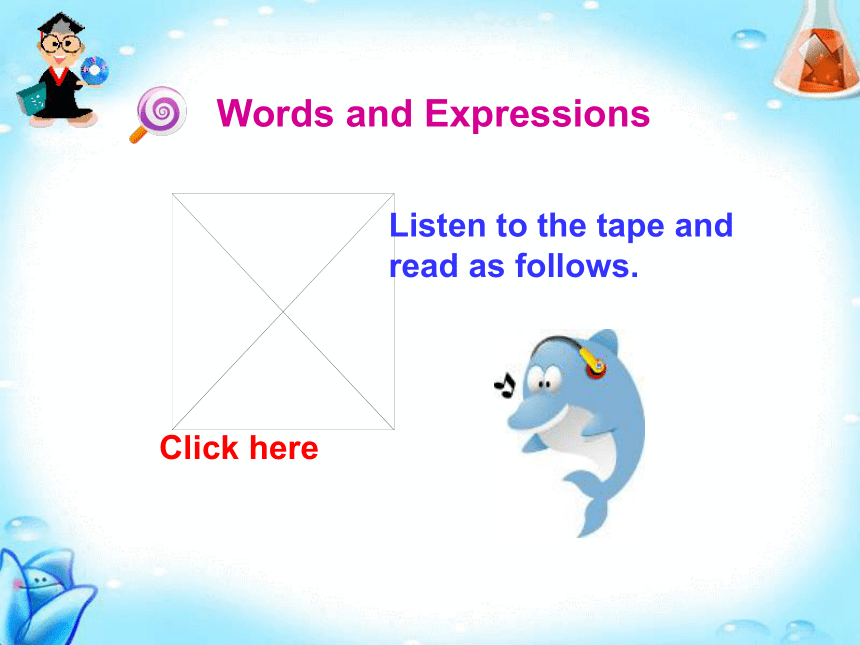
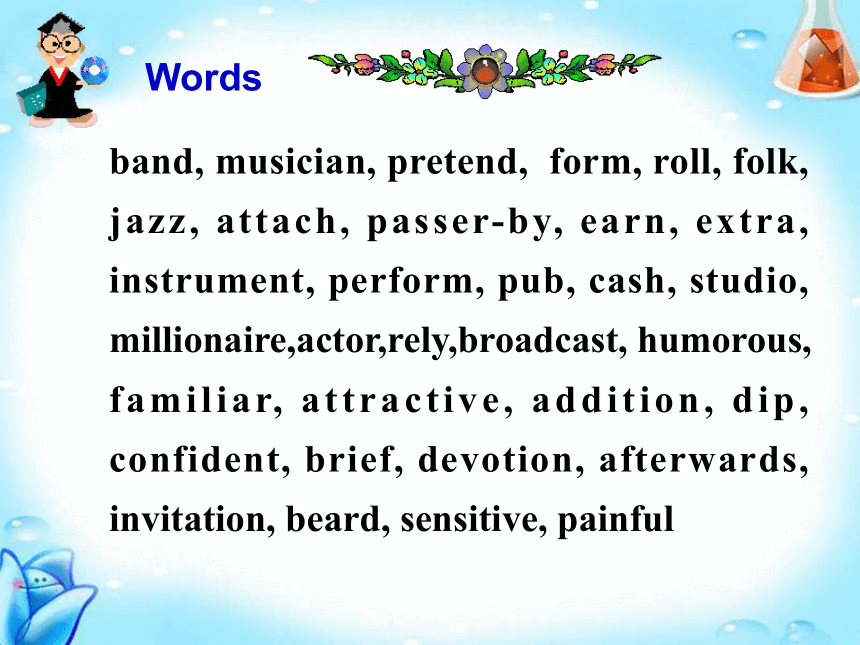
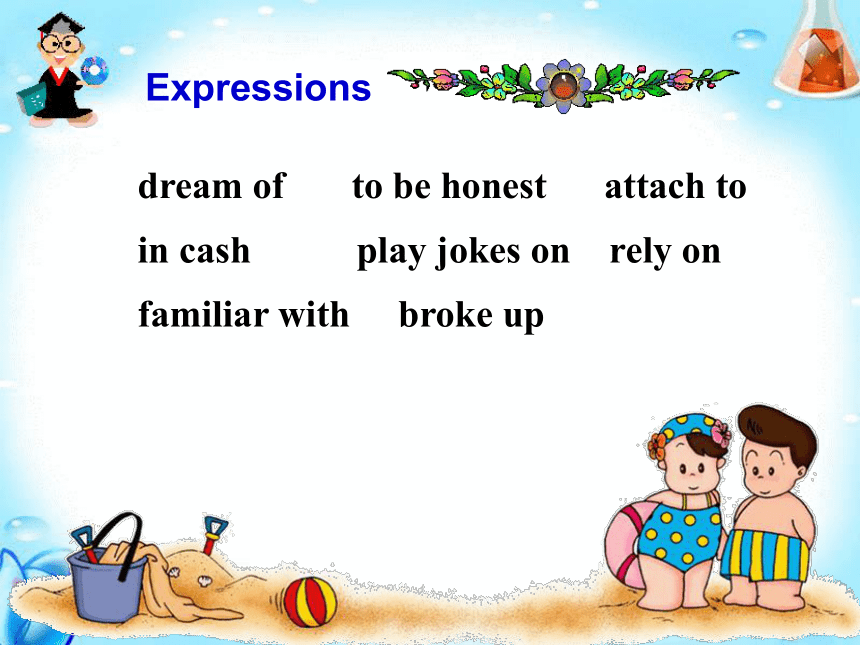
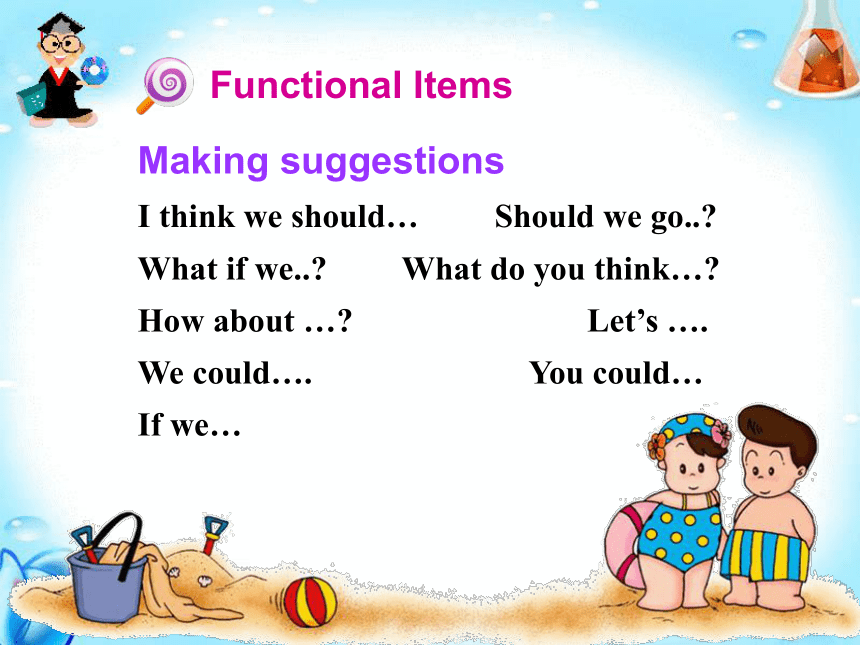
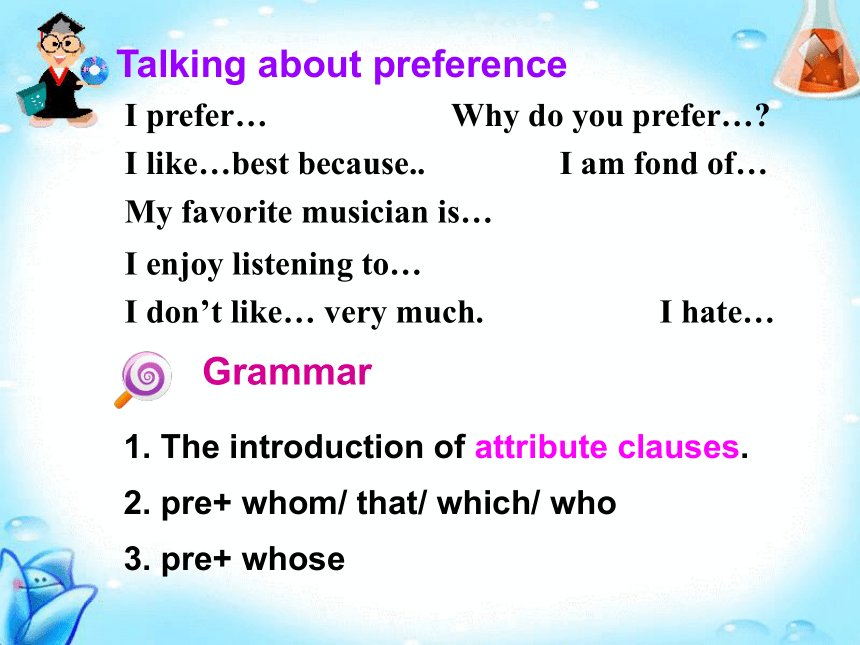
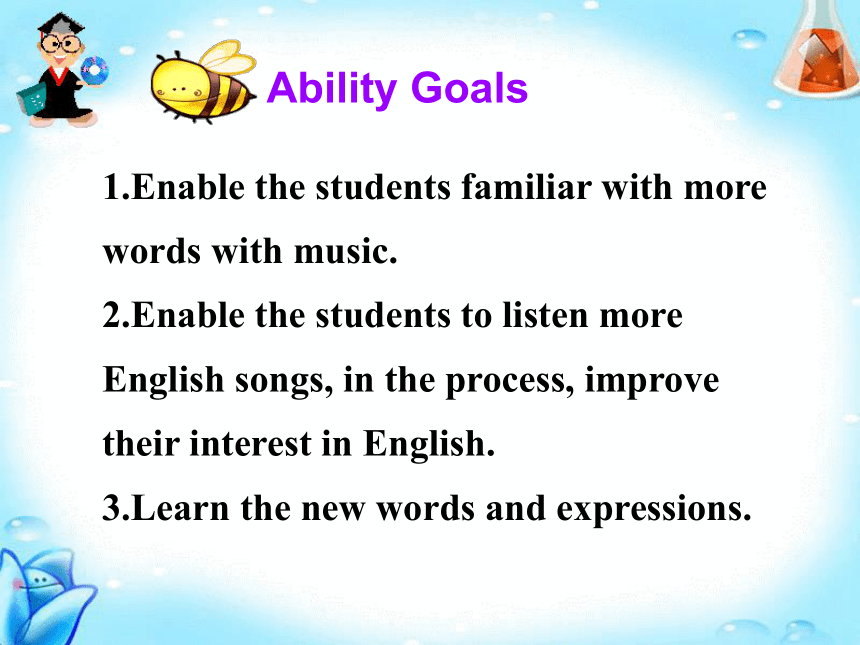
文档简介
(共115张PPT)
piano
Which instrument do you like best ? What are they deeply connected with?
guitar
flute
zithers
Sax
harp
Violin
Which instrument do you like best?
Can you name other instruments in English?
How do people form a band?
What’s the charming of music?
What can you get from music?
Listen to the tape and read as follows.
Click here
band, musician, pretend, form, roll, folk, jazz, attach, passer-by, earn, extra, instrument, perform, pub, cash, studio, millionaire,actor,rely,broadcast, humorous, familiar, attractive, addition, dip, confident, brief, devotion, afterwards, invitation, beard, sensitive, painful
Words
Expressions
dream of to be honest attach to
in cash play jokes on rely on
familiar with broke up
Making suggestions I think we should… Should we go..? What if we..? What do you think…? How about …? Let’s …. We could…. You could… If we…
Talking about preference ?I prefer… Why do you prefer…? ?I like…best because.. I am fond of… ?My favorite musician is…
I enjoy listening to… ?I don’t like… very much. I hate…
1. The introduction of attribute clauses.
2. pre+ whom/ that/ which/ who
3. pre+ whose
1.Enable the students familiar with more
words with music.
2.Enable the students to listen more
English songs, in the process, improve
their interest in English.
3.Learn the new words and expressions.
1.Songs may change your mood. Use it when you feel tired.
2.Are you a fan of some famous singers?
3.Think about the correct way of admiration.
1.The key words and expressions.
2.The newly learned grammar.
3.The knowledge of music.
1.What is attribute clause?
2.When and where can it be used?
How many kinds of music do you know? Which kind do you like best?
Classic music
Music is an art form whose medium is sound. Common elements of music are pitch (which governs melody and harmony), rhythm (and its associated concepts tempo, meter, and articulation), dynamics, and the sonic qualities of timbre and texture. The word derives from Greek μουσικ? (mousike), "(art) of the Muses".
The creation, performance, significance, and even the definition of music vary according to culture and social context. Music ranges from strictly organized compositions (and their recreation in performance), through improvisational music to aleatoric forms. Music can be divided into genres and subgenres, although the dividing lines and relationships between music genres are often subtle, sometimes open to individual interpretation, and occasionally controversial. Within "the arts", music may be classified as a performing art, a fine art, and auditory art.
About Music
Classical music
Classical music is a broad term that usually refers to mainstream music produced in, or rooted in the traditions of Western liturgical and secular music, encompassing a broad period from roughly the 9th century to present times. The central norms of this tradition became codified between 1550 and 1900, which is known as the common practice period.
Periods of European art music
Early
Medieval中世纪 ??(500–1400)
Renaissance
文艺复兴 (1400–1600)
Baroque巴罗克 (1600–1760)
Common practice
Baroque巴罗克 (1600–1760)
Classical
古典主义 (1730–1820)
Romantic
浪漫主义 (1815–1910)
Modern and contemporary
20th century (1900–2000)
Contemporary (1975–present
Classical music in its limited definition includes the works of Haydn, Mozart and Beethoven. From Mozart, a huge range of pieces offer us a chance to enjoy. Mozart wrote symphonies, music for quartets and quintets, chamber orchestra pieces, choral pieces, piano concertos, and entire operas. In total, he wrote over 600 musical pieces. He is perhaps best known for his opera, The Magic Flute . Most also recognize Eine Kleine Nachtmusik, as well as a number of his symphonies and concertos. Classical music may also refer to the native and folk music of any country. The styles vary greatly depending upon available instruments. For example, the classical music of Indonesia, with its use of the gamelan, is vastly different from what most would consider classical music of the western world. Folk traditions in other countries may seem more influential to western classical music. Musicians of the baroque and classical periods often adapted their works from folk music.
Chinese classical music is the traditional art or court music of China. It has a long history stretching for more than three thousand years. It has its own unique systems of musical notation, as well as musical tuning and pitch, musical instruments and styles or musical genres. Music of China appears to date back to the dawn of Chinese civilization, and documents and artifacts provide evidence of a well-developed musical culture as early as the Zhou Dynasty (1122 BC—256 BC). The Imperial Music Bureau, first established in the Qin Dynasty (221 BC—207 BC), was greatly expanded under the Emperor Han Wu Di (140 BC—87 BC) and charged with supervising court music and military music and determining what folk music would be officially recognized. In subsequent dynasties, the development of Chinese music was strongly influenced by foreign music, especially that of Central Asia.
Chinese classical music
Classic music
Johann Sebastian Bach巴赫
(1685—1750)
Handel韩德尔 (1685—1759)
Joseph Haydn海顿 (1732—1809)
Mozart 莫扎特(1756—1791)
Ludwig van Beethoven贝多芬
(1770—1827)
Franz Schubert舒伯特
(1797—1828)
Weber韦伯
(1786—1826)
Hector Berlioz
伯辽兹
(1803—1869)
Mendelssohn
门德尔松
(1809—1847)
Schumann舒曼
(1810—1856)
Chopin肖邦
(1810—1849)
Franz Liszt
李斯特
(1811—1886)
Richard Wagner瓦格纳
(1813—1883)
Johannes Brahms 勃拉姆斯
(1833—1897)
Giuseppe Verdi威尔第
(1813—1901)
Richard Strauss斯特劳斯
(1864—1949)
Claude Debussy德彪西
(1862—1918)
Symphony
A symphony is an extended musical composition, scored almost always for orchestra. "Symphony" does not necessarily imply a specific form though most are composed according to the sonata principle. Many symphonies are tonal works in four movements with the first in sonata form and this is often described by music theorists as the structure of a "classical" symphony, although many symphonies by the acknowledged classical masters of the form, Joseph Haydn, Wolfgang Amadeus Mozart and Ludwig van Beethoven, do not conform to this model.
Jazz
Popular music
Popular music belongs to any of a number of musical genres, and stands in contrast to art music, and traditional music which was disseminated orally. Although popular music sometimes is known as "pop music", the term pop music usually refers to a specific musical genre.
Justice in concert (2007)
Jazz has roots in the combination of Western and African music traditions, including spirituals, blues and ragtime, stemming from West Africa, western Sahel, and New England's religious hymns, hillbilly music, and European military band music. After originating in African American communities near the beginning of the 20th century, jazz styles spread in the 1920s, influencing other musical styles. The origins of the word jazz are uncertain. The word is rooted in American slang, and various derivations have been suggested.
Jazz is rooted in the blues, the folk music of former enslaved Africans in the U.S. South and their descendants, which is influenced by West African cultural and musical traditions that evolved as black musicians migrated to the cities. Jazz musician Wynton Marsalis states that "Jazz is something Negroes invented...the nobility of the race put into sound ... jazz has all the elements, from the spare and penetrating to the complex and enveloping.
Jazz
Folk music
Folk songs, rich colors of the national songs, ballads or civil popular called. The rich folk, religion, love, war, work, but also to drink, dance fun, festivals and so on. Performance of folk songs is not only a nation's feelings and still learning, so have their own unique scale and exotic style. French folk songs such as the booming, the enthusiasm of the Italian folk songs, ballads of the British honest, the Japanese folk songs of grief and indignation, the Spanish folk songs, Chinese folk songs, have shown a strong national character and color.
England folk: Britain's folk music until the late 19th century before Easter. At that time, a collection of nearly 3,000 the number of folk songs, of which more than 1,600 first, spread to North America Ebalaqi Mountains area. Strange to say, the real British traditional music in the United States kept by the local community more than the United Kingdom. The so-called British traditional music, its main characteristics is a native to music, and with pop music to tell stories of folk songs.
Folk songs
Country music
Country music was a federation of styles, rather than a monolithic style. Its origins were lost in the early decades of colonization, when the folk dances (Scottish reels, Irish jigs, and square dances, the poor man's version of the French "cotillion" and "quadrille") and the British ballad got transplanted into the new world and got contaminated by the religious hymns of church and camp meetings. The musical styles were reminiscent of their British ancestors. The Americans disliked the subject of love, to which they preferred practical issues such as real-world experiences (ranching, logging, mining, railroads) and real-world tragedies (bank robberies, natural disasters, murders, train accidents). The instrumentation included the banjo, introduced by the African slaves via the minstrel shows, the Scottish "fiddle" (the poor man's violin, simplified so that the fiddler could also sing) and the Spanish guitar (an instrument that became popular in the South only around 1910).
Country music
Pop music
Pop music is a music genre that developed from the mid-1950s as a softer alternative to rock 'n' roll and later to rock music. It has a focus on commercial recording, often orientated towards a youth market, usually through the medium of relatively short and simple love songs. While these basic elements of the genre have remained fairly constant, pop music has absorbed influences from most other forms of popular music, particularly borrowing from the development of rock music, and utilizing key technological innovations to produce new variations on existing themes.
Pop music
Stylistic
origins Rock and roll ? Jazz ? Doo-wop ? Folk ? Dance music
Cultural
origins 1950s, United States and United Kingdom
Typical
instruments Vocals ? Electric guitar ? Bass guitar ? Drums ? Keyboards ? Synthesizer ? Drum machine ? Sequencer ? Sampler
Mainstream
popularity Continuous worldwide since emergence
键盘乐器keyboard instrument
钢琴 piano
风琴 organ
管风琴 pipe organ
古钢琴 ancient piano
羽管键琴 harpsichord
手风琴 accordion
电子琴electric piano
电钢琴electric piano
电子三角钢琴electron grand piano
拨弦乐器plucked stringed musical instrument
吉他 guitar
电吉他 electric guitar
竖琴 harp
低音吉他 bass guitar
木管乐器woodwind instrument
单簧管 clarinet
双簧管 oboe
英国管 the Britain manages
长笛 flute
短笛piccolo
口琴 harmonica
巴松管 bassoon
萨克斯管 saxophone
簧风琴reed organ
爵士风琴Knight organ
探戈手风琴Tango accordion
排箫panpipes
铜管乐器brass wind instrument
小号 trumpet
短号 short number
冲锋号 the charge sound
法国号 French horn
长号 noisy wailing
次中音号 tenor horn
上低音号 baritone
低音号 trombone
Names of some musical instruments
弓弦乐器stringed musical instrument
小提琴 violin
中提琴 viola
大提琴 cello
低音提琴double bass
二胡 urheen
打击乐器percussion instrument
定音鼓 kettledrum
木琴 xylophone
钟琴 carillon
马林巴琴Malinbaqin
钢片琴celesta
锣 gong
钹 cymbals
小军鼓 small armed forces drum
大鼓 big drum
爵士鼓 Knight drum
日本鼓Japanese drum
清脆铃clear bell
Which kind of music do you like best?
Do you know some masterpieces of each kind?
Beethoven is often described as a "giant straddling two styles": the Classical and the Romantic. Indeed, it is a testimony to Beethoven's place in history that he is claimed for both periods. Whether Beethoven was a Classical or a Romantic composer, however, is beside the point. Instead, we might best view him as a new composer for a new age -- an age that is reflected in both musical as well as the nonmusical worlds.
Beethoven
many published scores and recordings using this full name), Haydn used his second name much of his life, spelling it in German as "Josef" and signing letters and documents as "Josef Haydn".
Franz Joseph Haydn, (March 31 or April 1, 1732 – May 31, 1809) was a leading composer of the Classical period, called the "Father of the Symphony" and "Father of the String Quartet". Although he has come to be popularly known as "Franz Joseph Haydn" (with
Wolfgang Amadeus Mozart (1756-1791), Austrian composer, who is considered one of the most brilliant and versatile composers ever. He worked in all musical genres of his era, wrote inspired works in each genre, and produced an extraordinary number of
compositions, especially considering his short life. By the time Mozart died at age 35, he had completed 41 symphonies, 27 piano concertos, 23 string quartets, 17 piano sonatas, 7 major operas, and numerous works for voice and other instruments.
1. Can you predict what it is going to be showed in the text after looking at the title and those pictures?
2. Some films are mainly produced with many music and songs in it. Have you ever seen that kind of film?
The phantom of the opera
歌剧魅影
The sound of music
音乐之声
High school musical 歌舞青春
Bring it on 美少女拉拉队
Music and lyrics k歌情人
My fair lady 窈窕淑女
Scarborough Fair
Listen to the tape and read as follows.
Click here
1. Read the passage quickly and try to answer the following questions: ?1)What are the benefits if students form a band to play in the street? ?2) When did “The Monkees” break up and when did it reunite? ?3) Why was “ The Monkees” successful in their work?
2. Look over the text and generate the main idea of each paragraph in your own words.
Paragraph Main idea
1 Many people want to be famous as singers or musicians.
2
3
4
3. Write down the new words you are not familiar with.
Read the passage again and guess the meaning of them before you look at it in the appendixes。
4. Discuss with your partner about the magic effect of the music to you .
To be honest, a lot of people attach importance to becoming rich and famous.
说实在的,很多人把名和利看得很重要。
attach…to 认为很有(重要性,意义等)例如:
I attach great importance to the education of my daughter.?
我十分重视对我女儿的教育。
attach…to 附上;连接;附属。例如:
Mum asks me to attach the label to my luggage when I have a trip abroad.
妈妈要求我在去国外旅行时把标签贴(系)在行李上。
This small company is attached to TCL.
这家小公司附属于TCL 集团。
be attached to 喜爱;喜欢。
Fans are all attached to this pop singer who comes from Malaysia.
歌迷们都很喜欢这位来自马来西亚的流行歌手。
2. Sometimes they may play to passers-by in the street or subway so that they can earn some extra money for themselves or to pay for their instruments.
有时他们可能会在街上或地铁里为过路者演奏,这样他们可以为自己或自己要买的乐器多挣一些钱。
so that 引导的是一个目的状语从句。例如:
Her parents pinched and scraped so that she could study singing abroad.
她父母省吃俭用好让她出国学习声乐.
I wrote so that he might/would know when to expect us.
我写信好让他知道我们什么时候到.
3. The musicians were to play jokes on each other as well as play music, most of which was based loosely on the Beatles.
组成乐队的音乐人演奏音乐,还彼此打趣逗笑。这些玩笑和音乐大多都在模仿“甲壳虫”乐队。
play jokes 开玩笑。例如:
Mark Twain liked to play jokes on his friends when they lost their attention to the topic.
马克·吐温喜欢在朋友们失去了对问题的注意时开他们的玩笑。
play jokes on 跟……开玩笑。例如:
Your mother has been frightened to death. You must never play these practical jokes on her.
你把你妈妈都吓坏了,你以后再不能这样和她恶作剧了。
My little son is fond of playing practical jokes on me.
我的小儿子喜欢对我玩恶作剧。
4. Then they produced their own records and started touring and playing their own music.
然后他们录制自己的唱片,并且开始巡回表演他们自己的音乐。
tour 巡回比赛或演出。例如:
The European PGA Tour will be held in America .
本届的欧洲职业高尔夫球巡回赛将会在美国举行。
I’m awfully sorry that you can’t see him now, because he is on tour in London for his speech.
很抱歉,你现在见不到他,因为他现在在伦敦巡回演讲。
Beatles
Background
The Beatles were a rock music sensation in the 1960s and 1970s. Everyone had a favorite among the four. For some people, it was Paul McCartney, the sweet one, or John Lennon, the funny one. For others, it was George Harrison, the mystery man, or Ringo Starr, the bouncy drummer. The Beatles changed popular music for all time, with their songs and their sparkling personalities. All four Beatles were born in Liverpool, England. All four loved music, especially American rhythm-and-blues and rock music. Lennon and McCartney were the main songwriters, with Harrison as their brilliant guitarist. When Starr joined
up in 1962, the group began rocking with the songs “Love Me Do,” “Please Please Me,” “I Want to Hold Your Hand,” and “She Loves You.” In 1964, the group appeared on American television’s The Ed Sullivan Show. They were seen by 73 million people, and the sensation known as Beatle mania was launched. Screaming fans followed the Beatles everywhere and bought their records in unheard-of numbers. The movies A Hard Day's Night (1964) and Help (1965) revealed the Beatles’ energy and sense of humor. The group seemed more appealing than ever. In their music, the Beatles moved from simple love songs to songs about changes taking place in 1960s society. The albums Rubber Soul and Revolver were considered musical breakthroughs.
Performing before audiences became too dangerous because of the crush of fans. The Beatles gave their last public concert in 1966, but they kept on making records. Many consider Sgt. Pepper's Lonely Hearts Club Band (1967) to be their finest album. The Beatles break up In 1970, the Beatles announced their breakup. Enormous popularity had taken its toll, wearing them down and causing disagreements. Each of the Beatles went on to a solo career. But fans always hoped the group would get back together. This hope ended when Lennon was murdered by an obsessed fan in 1980. In 2001, Harrison died of cancer. But fans know that the Beatles will somehow never really die. Microsoft ? Encarta ? 2006. ? 1993-2005 Microsoft Corporation. All rights reserved.
Monkees 门基乐队
Monkees 门基乐队
Backstreet Boys
A quintet of hunkalicious singing vocalists, the Backstreet Boys is, probably the most popular vocal group outside the United States. If we are the fans for western pop songs and are interested in B-Boys, let's take a look at their growing path from the very beginning.
The B-Boys gelled in 1993, in Orlando, where high school students A.J. McLean and Howe Drought, and junior high student Nick Carter frequently ran into each other[1] at acting auditions. They began hanging out[2], started singing, and eventually Kevin Richardson and his Kentucky cousin, Brian Littrell joined in. Though their eponymous debut album[3] has by now sold
more than 10 million
copies in the U.S. The
quintet's 1995 single,
"We've Got It Going'
On" fizzled after
climbing to No. 69
on Billboard's Hot 100.
Backstreet Boys
La Papillion
I’d like to suggest…
I’d like to suggest holding a party for our victory.
2.How /What about…?
What about having a holiday in my grandma's home?
3.Let me say that…
Let me say that you are not a man in your parents’ eyes but a boy forever.
4.What do you think…?
What do you think about this project?
5.Why don’t we…?
Why don’t we read the book instead of the magazine?
6.I think we should…
I think we should pay more attention to the education of the next generation.
7.Maybe we could…
Maybe we could give our hands to him for the
establishment of the nature park.
1.roll
n. 卷, 滚动, 名单, 案卷, 压路机
call the roll 点名
honor roll [roll of honor] 光荣榜 阵亡将士名录
in the roll of 载入......名单, 跻身......之列
vi. 滚, 滚动, 飘流, 起伏, 卷, 绕
roll in 滚滚而来, 纷至沓来 在......中翻滚; 用......裹起来
roll around (时间)流逝 (季节等)重临, 循环
roll back 把...卷起来 (潮、浪)退落 (使)退却, 击退 (旧事)回到某人记忆中
vt. 使滚动, 卷, 绕
Roll your sleeve up.?把你的袖子卷起来。
Roll my log and I'll roll yours.
你帮我的忙我也帮你的忙。
2.form
n. 形状, 形体, 类型, 方式, 表格, 形式
The articles are arranged in dictionary form.
这些条目是以词典的形式排列的。
an arrival form 来客登记表
vt. 形成, 排列, (使)组成
form into 组成......, 编成......
Energy is capable of being converted from one
form into another .?
能可以从一种形式转化为另一种形式。
form part of 组成......的一部分, 成为......的要素
3.broadcast
n. 广播, 传播
a broadcast via radio
通过收音机进行的广播
vt. 广播
The President will broadcast his message on all stations tonight.
总统今晚将向全国广播国情咨文。
adj.广播的
Everyone heard the broadcast rumors about the mystery castle.
所有人都听说了关于这个神秘城堡的广为散布的谣言。
4. extra
adj. 额外的;外加的;特别的;另外的
I don’t have any extra time.
我没有多余的时间。
The box is extra heavy. 这个箱子特别重。 adv. 额外地,特别地,除外
They charge extra for wine. 他们另收酒钱。 n.额外的东西;另收费的事物
Her school fees are $ 300 a term, music and dancing are extras. 她的学费是每学期300美元,音乐和舞蹈课另收费。
5. familiar
adj.日常的; 常见的; 熟悉的, 精通的
Sometimes I can’t find things familiar to me in my room.
有时我会找不到在我房间的我所熟悉的东西。
He is very familiar with English.
他通晓英语。
亲密的
She is one of my familiar friends in my childhood.
她是我儿时的亲密朋友之一。
无拘束的, 随便的
His manner is too familiar. 他的态度太随便了。
习惯用语
be familiar to 为…所熟悉
be familiar with 熟悉, 通晓, 精通
make oneself familiar with 同......好[熟悉]起来; 同......亲近起来
familiar, intimate 与confidential都含“亲密的”, “亲近的”意思。 familiar 指“通过经常接触了解而不拘礼节的”, 如:
I'm not familiar with her . 我同她不太熟悉。
intimate 指 “关系密切的”, 如:
He is my intimate friend when I study in England.
他是我在英国留学时的密友。
confidential 指“亲信的, 机要的, 心腹的”, 如:
She became my confidential secretary for her careful attitude.
她因为态度认真而当了我的机要秘书。
6. rely
vt.倚赖, 依靠
You can’t rely on the weather, it will change quickly. 天气是靠不住的,它会变化很快。
Blind people rely a lot on touch.? 盲人在很大程度上依靠触觉。
信任, 信赖 (on, upon)
You may rely on his judgment this time.? 你这次可以信赖他的判断。
I promise that you can rely on her words forever.? 我发誓你可以永远相信她的话。
习惯用语
rely on (upon) 依靠;信任,信赖rely upon it 放心
rely与 depend 都含“信赖”的意思,它们的具体区别如下: rely 指“在过去经验的基础上, 依赖、相信某人或某事物, 希望从中得到支持或帮助”, 如:
He can be relied on to keep secret.
相信他能保密。
depend 指“出于信赖而依靠他人或他物, 以取得其支持或帮助, 这种信赖可能有过去的经验或了解为根据, 也可能没有”, 如:
He can depend on his wife for sympathy.
他相信妻子会同情他。
1.-ance 构成抽象名词,表示性质等?
abundance 丰富 performance 表演
2. -ment 附在动词或动词词根后构成名词表示被动意义? bewilderment 迷惑
-ment 附在动词或动词词根后构成名词表示工具或器物?document 公文
-ment 附在动词或动词词根后构成名词表示行为的具体结果? achievement 成就
-ment 附在动词或动词词根后构成名词表示行为或动作?
argument 争论
-ment 附在动词或动词词根后构成名词表示性质或状态?
contentment 满足
1.dream of 梦想,幻想,向往
She nourished the dream of becoming a movie star.?
她曾怀有成为电影明星的梦想。
This expedition has been the favourite dream of my early years.
这样的探险我自孩提时就憧憬向往不已的。
dream的其他用法
(1) dream vt. 意为“做梦;梦见”,可以接名词,代词或宾语从句。
May you dream a happy dream tonight!
祝你今晚做个好梦。
I never dream that I would spend my old age in
such comfort and happiness.? ?
我做梦也没有想到我能过这样舒适幸福的晚年。
(2) dream n. 意为“梦”,可接同位语从句说明梦的内容。
I have a recurrent dream that I’ve turned into an elephant.
我经常有这样一个梦我变成了一头大象。
My dream has come true by my hardworking.
通过我的刻苦工作我的梦想成真了。
2. to be honest 老实说
To be honest, you have finished the task successfully.
老实说,你很出色地完成了任务。
To be honest, I don’t like this job.
老实说,我并不喜欢这项工作。
3. in cash 用现金
Please pay the bill in cash.?请用现金结账。
You can pay in check or in cash.
你们可以用支票付款,也可以用现金付款。
4. rely on 依赖,依靠
Don' t rely on him to do anything he' s just a talker.
什么事都不要依靠他,他光会说空话.
In default of expert's help, you'll have to rely on yourselves.
没有专家的帮助,你们只好依靠自己了。?
5. familiar with 熟悉,精通
She is familiar with English.
她通晓英语。
Are you familiar with factory work?
你对工厂工作熟悉吗? ?
6. break up 结束,分手
She has been depressed since she broke up with her boyfriend.
她自从与男朋友断绝关系以来一直情绪消沉。
The upshot of the disagreement was that they broke up the partnership.?
分歧造成的结局是,他们解除了合作关系。?
关于break的其他搭配: (1) break down (因机械、电力等故障)停止运转;崩溃;瓦解 (2) break in 打断
(3) break into sth. 强行进入某处;突然开始(大笑等) (4) break off (说话时)突然打住 (5) break out (战争、火山等)突然发生 (6) break through 突破;穿过
7. sort out 分类;挑出
Sort out these papers and fasten them together with a clip, please.? ?
请把这些文件整理一下,用夹子夹在一起。
It's our job to sort out grievances.
弄清冤情是我们的职责。
Find the proper expressions which has the same meaning .
1. to think about something that you would like to happen or have (dream of)
2. spoken language used when you tell someone what you really think (to be honest)
3. to think that something is important or true and that it should be considered seriously (attach importance to)
4. give someone money for something you buy or for a service in the form of coins or notes rather than cheques, credit cards, etc (pay in cash)
定语从句(Attributive Clause)在句中作定语,修饰一个名词或代词,被修饰的名词、词组或代词即先行词。定语从句通常出现在先行词之后,由关系词(关系代词或关系副词)引出。 关系代词有:who, whom, whose, that, which等。 关系副词有: when, where, why等。
定语从句(Attributive Clause)
关系代词所代替的先行词是人或物的名词或代词,并在句中充当主语、宾语、定语等成分。关系代词在定语从句中作主语时,从句谓语动词的人称和数要和先行词保持一致。 (1)who, whom, that 这些词代替的先行词是人的名词或代词,在从句中所起作用如下: Is he the man who/that wants to see you? 他就是你想见的人吗?(who/that在从句中作主语)
1.关系代词引导的定语从句
He is the man whom/ that I saw yesterday. 他就是我昨天见的那个人。(whom/that在从句中作宾语) (2)Whose 用来指人或物,(只用作定语, 若指物,它还可以同of which互换), 例如: They rushed over to help the man whose car had broken down.
那人车坏了,大家都跑过去帮忙。 Please pass me the book whose (of which) cover is green.
请递给我那本绿皮的书。
(3)which, that 它们所代替的先行词是事物的名词或代词,在从句中可作主语、宾语等,例如: A prosperity which / that had never been seen before appears in the countryside.
农村出现了前所未有的繁荣。(which / that在句中作主语) The package (which / that) you are carrying is about to come unwrapped.
你拿的包快散了。(which / that在句中作宾语)
关系副词可代替的先行词是表示时间、地点或理由的名词,在从句中作状语。 (1)when, where, why 关系副词when, where, why的含义相当于“介词+ which”结构,因此常常和“介词+ which”结构交替使用,例如: There are occasions when (on which) one must yield.
任何人都有不得不屈服的时候。
2.关系副词引导的定语从句
Beijing is the place where (in which) I was born. 北京是我的出生地。 (2)that代替关系副词 that可以用于表示时间、地点、方式、理由的名词后取代when, where, why和“介词+ which”引导的定语从句,在口语中that常被省略,例如:
His father died the year (that / when / in which) he was born.
他父亲在他出生那年逝世了。 He is unlikely to find the place (that / where / in which) he lived forty years ago.
他不大可能找到他四十年前居住过的地方。
专项练习
1. The gentleman _______ you told me yesterday proved to be a thief. A. who B. about whom
C. whom D. with whom
2. Can you think out a situation ______ this idiom can be used? A. which B. that
C. with which D.where
B
D
3. This textbook is used by students ______ native language is not English. A. which B. who
C. of whom D. whose
4. By using both ears one can tell the direction ______ a sound comes. A. in which B. from which
C. with which D. through which
D
A
5. I don't believe the reason ______ he has given for his being late. A. why B. that C. how D.what
6. The professor made his first speech ______ he talked about some subjects the students were interested. A. that B. which
C. in which D. of which
C
B
using language listening
2. using language listening and reading
3. Workbook listening task
4. Workbook listening
5. Workbook reading task
Imagine you are a famous singer. Wherever you go, your fans will clap and appreciate you and your music. You are really received a lot for, but, at the same time, you are not very happy sometimes. Try to tell them your sad and happy of being famous.
Read Freddy’s reply in the book on page 40. work out the questions that may be asked and the reasons for each question.
Finish the letter on page 39 politely by thanking for his help.
Correct the letter with your partner.
Useful words
band, musician, pretend, form, roll, folk, jazz, attach, passer-by, earn, extra, instrument, perform, pub, cash, studio, millionaire, actor, rely, broadcast, humorous, familiar, attractive, addition, dip, confident, brief, devotion, afterwards, invitation, beard, sensitive, painful
Useful Expressions
dream of to be honest
attach to in cash
play jokes on rely on
familiar with broke up
定语从句是指在复合句中修饰名词或代词的从句。
定语从句的引导词有:
1. 关系代词that, which, who,whose
2. 关系副词when, where, why
定语从句还分为限定性定语从句和非限定性定语从句。
New Grammar
1. It’s helpful to put children in a situation they can see themselves differently. (2009福建)
A. that B. when C. which D. where
【答案】D 考查定语从句。先行词是situation,指物,亦可指地点,关系词在从句中做地点状语,用关系副词where,选D。
2. She’ll never forget her stay there ________ she found her son who had gone missing two years before. (2009四川)
A. that B. which C. where D. when
【答案】D 考查定语从句的用法。her stay为先行词,可以理解为抽象的一段时间(她呆在那里期间),when指代her stay在定语从句中做时间状语。故答案选D。
3. Gun control is a subject Americans have argued for a long time. (2009陕西)
A. of which B. with which C. about which D. into which
【答案】C 考查定语从句,先行词是Gun control,指物,关系词在从句中做介词的宾语,介词前置,介词与从句动词构成搭配argue about sth,选C。
5. She brought with her three friends, none of I had ever met before. (2009海南)
A. them B. who
C. whom D. these
【答案】C。 考查定语从句中的非限制性定语从句。句意为:她带着她的三个朋友,他们三个中没有一个人我曾见过。表示“部分的词语+of+关系代词” 在非限制性定语从句指人只能用whom。
一. 单选选择
1.This dictionary, the few pages ______ are missing, is of no use. A among which B of which
C in which D to which 2.______ is known to all, Taiwan is a part of China. A As B Which C That D What
3. I'll never forget the years ______ I lived in the country with the farmers, ______ has a great effect on my life. A. that, which B. when, which C. which, that D.when, who 4. I saw some trees ______ the leaves were black with disease. A. where B. of which C. in which D.whose
5. The building ______ windows are bright is our school library. A where B of which C in which D whose
答案1-5 BABBD
二. 填空
1 This is the professor taught me chemistry in 1980 .
2 The hospital was built five years ago has been modernized.
3 This is the boy father died three years ago.
4、The film we saw the day before yesterday is very interesting.
5、Do you know the student was praised at the meeting?
答案
1、who / that 2、which / that
3、whose 4、which / that 5、who / that
piano
Which instrument do you like best ? What are they deeply connected with?
guitar
flute
zithers
Sax
harp
Violin
Which instrument do you like best?
Can you name other instruments in English?
How do people form a band?
What’s the charming of music?
What can you get from music?
Listen to the tape and read as follows.
Click here
band, musician, pretend, form, roll, folk, jazz, attach, passer-by, earn, extra, instrument, perform, pub, cash, studio, millionaire,actor,rely,broadcast, humorous, familiar, attractive, addition, dip, confident, brief, devotion, afterwards, invitation, beard, sensitive, painful
Words
Expressions
dream of to be honest attach to
in cash play jokes on rely on
familiar with broke up
Making suggestions I think we should… Should we go..? What if we..? What do you think…? How about …? Let’s …. We could…. You could… If we…
Talking about preference ?I prefer… Why do you prefer…? ?I like…best because.. I am fond of… ?My favorite musician is…
I enjoy listening to… ?I don’t like… very much. I hate…
1. The introduction of attribute clauses.
2. pre+ whom/ that/ which/ who
3. pre+ whose
1.Enable the students familiar with more
words with music.
2.Enable the students to listen more
English songs, in the process, improve
their interest in English.
3.Learn the new words and expressions.
1.Songs may change your mood. Use it when you feel tired.
2.Are you a fan of some famous singers?
3.Think about the correct way of admiration.
1.The key words and expressions.
2.The newly learned grammar.
3.The knowledge of music.
1.What is attribute clause?
2.When and where can it be used?
How many kinds of music do you know? Which kind do you like best?
Classic music
Music is an art form whose medium is sound. Common elements of music are pitch (which governs melody and harmony), rhythm (and its associated concepts tempo, meter, and articulation), dynamics, and the sonic qualities of timbre and texture. The word derives from Greek μουσικ? (mousike), "(art) of the Muses".
The creation, performance, significance, and even the definition of music vary according to culture and social context. Music ranges from strictly organized compositions (and their recreation in performance), through improvisational music to aleatoric forms. Music can be divided into genres and subgenres, although the dividing lines and relationships between music genres are often subtle, sometimes open to individual interpretation, and occasionally controversial. Within "the arts", music may be classified as a performing art, a fine art, and auditory art.
About Music
Classical music
Classical music is a broad term that usually refers to mainstream music produced in, or rooted in the traditions of Western liturgical and secular music, encompassing a broad period from roughly the 9th century to present times. The central norms of this tradition became codified between 1550 and 1900, which is known as the common practice period.
Periods of European art music
Early
Medieval中世纪 ??(500–1400)
Renaissance
文艺复兴 (1400–1600)
Baroque巴罗克 (1600–1760)
Common practice
Baroque巴罗克 (1600–1760)
Classical
古典主义 (1730–1820)
Romantic
浪漫主义 (1815–1910)
Modern and contemporary
20th century (1900–2000)
Contemporary (1975–present
Classical music in its limited definition includes the works of Haydn, Mozart and Beethoven. From Mozart, a huge range of pieces offer us a chance to enjoy. Mozart wrote symphonies, music for quartets and quintets, chamber orchestra pieces, choral pieces, piano concertos, and entire operas. In total, he wrote over 600 musical pieces. He is perhaps best known for his opera, The Magic Flute . Most also recognize Eine Kleine Nachtmusik, as well as a number of his symphonies and concertos. Classical music may also refer to the native and folk music of any country. The styles vary greatly depending upon available instruments. For example, the classical music of Indonesia, with its use of the gamelan, is vastly different from what most would consider classical music of the western world. Folk traditions in other countries may seem more influential to western classical music. Musicians of the baroque and classical periods often adapted their works from folk music.
Chinese classical music is the traditional art or court music of China. It has a long history stretching for more than three thousand years. It has its own unique systems of musical notation, as well as musical tuning and pitch, musical instruments and styles or musical genres. Music of China appears to date back to the dawn of Chinese civilization, and documents and artifacts provide evidence of a well-developed musical culture as early as the Zhou Dynasty (1122 BC—256 BC). The Imperial Music Bureau, first established in the Qin Dynasty (221 BC—207 BC), was greatly expanded under the Emperor Han Wu Di (140 BC—87 BC) and charged with supervising court music and military music and determining what folk music would be officially recognized. In subsequent dynasties, the development of Chinese music was strongly influenced by foreign music, especially that of Central Asia.
Chinese classical music
Classic music
Johann Sebastian Bach巴赫
(1685—1750)
Handel韩德尔 (1685—1759)
Joseph Haydn海顿 (1732—1809)
Mozart 莫扎特(1756—1791)
Ludwig van Beethoven贝多芬
(1770—1827)
Franz Schubert舒伯特
(1797—1828)
Weber韦伯
(1786—1826)
Hector Berlioz
伯辽兹
(1803—1869)
Mendelssohn
门德尔松
(1809—1847)
Schumann舒曼
(1810—1856)
Chopin肖邦
(1810—1849)
Franz Liszt
李斯特
(1811—1886)
Richard Wagner瓦格纳
(1813—1883)
Johannes Brahms 勃拉姆斯
(1833—1897)
Giuseppe Verdi威尔第
(1813—1901)
Richard Strauss斯特劳斯
(1864—1949)
Claude Debussy德彪西
(1862—1918)
Symphony
A symphony is an extended musical composition, scored almost always for orchestra. "Symphony" does not necessarily imply a specific form though most are composed according to the sonata principle. Many symphonies are tonal works in four movements with the first in sonata form and this is often described by music theorists as the structure of a "classical" symphony, although many symphonies by the acknowledged classical masters of the form, Joseph Haydn, Wolfgang Amadeus Mozart and Ludwig van Beethoven, do not conform to this model.
Jazz
Popular music
Popular music belongs to any of a number of musical genres, and stands in contrast to art music, and traditional music which was disseminated orally. Although popular music sometimes is known as "pop music", the term pop music usually refers to a specific musical genre.
Justice in concert (2007)
Jazz has roots in the combination of Western and African music traditions, including spirituals, blues and ragtime, stemming from West Africa, western Sahel, and New England's religious hymns, hillbilly music, and European military band music. After originating in African American communities near the beginning of the 20th century, jazz styles spread in the 1920s, influencing other musical styles. The origins of the word jazz are uncertain. The word is rooted in American slang, and various derivations have been suggested.
Jazz is rooted in the blues, the folk music of former enslaved Africans in the U.S. South and their descendants, which is influenced by West African cultural and musical traditions that evolved as black musicians migrated to the cities. Jazz musician Wynton Marsalis states that "Jazz is something Negroes invented...the nobility of the race put into sound ... jazz has all the elements, from the spare and penetrating to the complex and enveloping.
Jazz
Folk music
Folk songs, rich colors of the national songs, ballads or civil popular called. The rich folk, religion, love, war, work, but also to drink, dance fun, festivals and so on. Performance of folk songs is not only a nation's feelings and still learning, so have their own unique scale and exotic style. French folk songs such as the booming, the enthusiasm of the Italian folk songs, ballads of the British honest, the Japanese folk songs of grief and indignation, the Spanish folk songs, Chinese folk songs, have shown a strong national character and color.
England folk: Britain's folk music until the late 19th century before Easter. At that time, a collection of nearly 3,000 the number of folk songs, of which more than 1,600 first, spread to North America Ebalaqi Mountains area. Strange to say, the real British traditional music in the United States kept by the local community more than the United Kingdom. The so-called British traditional music, its main characteristics is a native to music, and with pop music to tell stories of folk songs.
Folk songs
Country music
Country music was a federation of styles, rather than a monolithic style. Its origins were lost in the early decades of colonization, when the folk dances (Scottish reels, Irish jigs, and square dances, the poor man's version of the French "cotillion" and "quadrille") and the British ballad got transplanted into the new world and got contaminated by the religious hymns of church and camp meetings. The musical styles were reminiscent of their British ancestors. The Americans disliked the subject of love, to which they preferred practical issues such as real-world experiences (ranching, logging, mining, railroads) and real-world tragedies (bank robberies, natural disasters, murders, train accidents). The instrumentation included the banjo, introduced by the African slaves via the minstrel shows, the Scottish "fiddle" (the poor man's violin, simplified so that the fiddler could also sing) and the Spanish guitar (an instrument that became popular in the South only around 1910).
Country music
Pop music
Pop music is a music genre that developed from the mid-1950s as a softer alternative to rock 'n' roll and later to rock music. It has a focus on commercial recording, often orientated towards a youth market, usually through the medium of relatively short and simple love songs. While these basic elements of the genre have remained fairly constant, pop music has absorbed influences from most other forms of popular music, particularly borrowing from the development of rock music, and utilizing key technological innovations to produce new variations on existing themes.
Pop music
Stylistic
origins Rock and roll ? Jazz ? Doo-wop ? Folk ? Dance music
Cultural
origins 1950s, United States and United Kingdom
Typical
instruments Vocals ? Electric guitar ? Bass guitar ? Drums ? Keyboards ? Synthesizer ? Drum machine ? Sequencer ? Sampler
Mainstream
popularity Continuous worldwide since emergence
键盘乐器keyboard instrument
钢琴 piano
风琴 organ
管风琴 pipe organ
古钢琴 ancient piano
羽管键琴 harpsichord
手风琴 accordion
电子琴electric piano
电钢琴electric piano
电子三角钢琴electron grand piano
拨弦乐器plucked stringed musical instrument
吉他 guitar
电吉他 electric guitar
竖琴 harp
低音吉他 bass guitar
木管乐器woodwind instrument
单簧管 clarinet
双簧管 oboe
英国管 the Britain manages
长笛 flute
短笛piccolo
口琴 harmonica
巴松管 bassoon
萨克斯管 saxophone
簧风琴reed organ
爵士风琴Knight organ
探戈手风琴Tango accordion
排箫panpipes
铜管乐器brass wind instrument
小号 trumpet
短号 short number
冲锋号 the charge sound
法国号 French horn
长号 noisy wailing
次中音号 tenor horn
上低音号 baritone
低音号 trombone
Names of some musical instruments
弓弦乐器stringed musical instrument
小提琴 violin
中提琴 viola
大提琴 cello
低音提琴double bass
二胡 urheen
打击乐器percussion instrument
定音鼓 kettledrum
木琴 xylophone
钟琴 carillon
马林巴琴Malinbaqin
钢片琴celesta
锣 gong
钹 cymbals
小军鼓 small armed forces drum
大鼓 big drum
爵士鼓 Knight drum
日本鼓Japanese drum
清脆铃clear bell
Which kind of music do you like best?
Do you know some masterpieces of each kind?
Beethoven is often described as a "giant straddling two styles": the Classical and the Romantic. Indeed, it is a testimony to Beethoven's place in history that he is claimed for both periods. Whether Beethoven was a Classical or a Romantic composer, however, is beside the point. Instead, we might best view him as a new composer for a new age -- an age that is reflected in both musical as well as the nonmusical worlds.
Beethoven
many published scores and recordings using this full name), Haydn used his second name much of his life, spelling it in German as "Josef" and signing letters and documents as "Josef Haydn".
Franz Joseph Haydn, (March 31 or April 1, 1732 – May 31, 1809) was a leading composer of the Classical period, called the "Father of the Symphony" and "Father of the String Quartet". Although he has come to be popularly known as "Franz Joseph Haydn" (with
Wolfgang Amadeus Mozart (1756-1791), Austrian composer, who is considered one of the most brilliant and versatile composers ever. He worked in all musical genres of his era, wrote inspired works in each genre, and produced an extraordinary number of
compositions, especially considering his short life. By the time Mozart died at age 35, he had completed 41 symphonies, 27 piano concertos, 23 string quartets, 17 piano sonatas, 7 major operas, and numerous works for voice and other instruments.
1. Can you predict what it is going to be showed in the text after looking at the title and those pictures?
2. Some films are mainly produced with many music and songs in it. Have you ever seen that kind of film?
The phantom of the opera
歌剧魅影
The sound of music
音乐之声
High school musical 歌舞青春
Bring it on 美少女拉拉队
Music and lyrics k歌情人
My fair lady 窈窕淑女
Scarborough Fair
Listen to the tape and read as follows.
Click here
1. Read the passage quickly and try to answer the following questions: ?1)What are the benefits if students form a band to play in the street? ?2) When did “The Monkees” break up and when did it reunite? ?3) Why was “ The Monkees” successful in their work?
2. Look over the text and generate the main idea of each paragraph in your own words.
Paragraph Main idea
1 Many people want to be famous as singers or musicians.
2
3
4
3. Write down the new words you are not familiar with.
Read the passage again and guess the meaning of them before you look at it in the appendixes。
4. Discuss with your partner about the magic effect of the music to you .
To be honest, a lot of people attach importance to becoming rich and famous.
说实在的,很多人把名和利看得很重要。
attach…to 认为很有(重要性,意义等)例如:
I attach great importance to the education of my daughter.?
我十分重视对我女儿的教育。
attach…to 附上;连接;附属。例如:
Mum asks me to attach the label to my luggage when I have a trip abroad.
妈妈要求我在去国外旅行时把标签贴(系)在行李上。
This small company is attached to TCL.
这家小公司附属于TCL 集团。
be attached to 喜爱;喜欢。
Fans are all attached to this pop singer who comes from Malaysia.
歌迷们都很喜欢这位来自马来西亚的流行歌手。
2. Sometimes they may play to passers-by in the street or subway so that they can earn some extra money for themselves or to pay for their instruments.
有时他们可能会在街上或地铁里为过路者演奏,这样他们可以为自己或自己要买的乐器多挣一些钱。
so that 引导的是一个目的状语从句。例如:
Her parents pinched and scraped so that she could study singing abroad.
她父母省吃俭用好让她出国学习声乐.
I wrote so that he might/would know when to expect us.
我写信好让他知道我们什么时候到.
3. The musicians were to play jokes on each other as well as play music, most of which was based loosely on the Beatles.
组成乐队的音乐人演奏音乐,还彼此打趣逗笑。这些玩笑和音乐大多都在模仿“甲壳虫”乐队。
play jokes 开玩笑。例如:
Mark Twain liked to play jokes on his friends when they lost their attention to the topic.
马克·吐温喜欢在朋友们失去了对问题的注意时开他们的玩笑。
play jokes on 跟……开玩笑。例如:
Your mother has been frightened to death. You must never play these practical jokes on her.
你把你妈妈都吓坏了,你以后再不能这样和她恶作剧了。
My little son is fond of playing practical jokes on me.
我的小儿子喜欢对我玩恶作剧。
4. Then they produced their own records and started touring and playing their own music.
然后他们录制自己的唱片,并且开始巡回表演他们自己的音乐。
tour 巡回比赛或演出。例如:
The European PGA Tour will be held in America .
本届的欧洲职业高尔夫球巡回赛将会在美国举行。
I’m awfully sorry that you can’t see him now, because he is on tour in London for his speech.
很抱歉,你现在见不到他,因为他现在在伦敦巡回演讲。
Beatles
Background
The Beatles were a rock music sensation in the 1960s and 1970s. Everyone had a favorite among the four. For some people, it was Paul McCartney, the sweet one, or John Lennon, the funny one. For others, it was George Harrison, the mystery man, or Ringo Starr, the bouncy drummer. The Beatles changed popular music for all time, with their songs and their sparkling personalities. All four Beatles were born in Liverpool, England. All four loved music, especially American rhythm-and-blues and rock music. Lennon and McCartney were the main songwriters, with Harrison as their brilliant guitarist. When Starr joined
up in 1962, the group began rocking with the songs “Love Me Do,” “Please Please Me,” “I Want to Hold Your Hand,” and “She Loves You.” In 1964, the group appeared on American television’s The Ed Sullivan Show. They were seen by 73 million people, and the sensation known as Beatle mania was launched. Screaming fans followed the Beatles everywhere and bought their records in unheard-of numbers. The movies A Hard Day's Night (1964) and Help (1965) revealed the Beatles’ energy and sense of humor. The group seemed more appealing than ever. In their music, the Beatles moved from simple love songs to songs about changes taking place in 1960s society. The albums Rubber Soul and Revolver were considered musical breakthroughs.
Performing before audiences became too dangerous because of the crush of fans. The Beatles gave their last public concert in 1966, but they kept on making records. Many consider Sgt. Pepper's Lonely Hearts Club Band (1967) to be their finest album. The Beatles break up In 1970, the Beatles announced their breakup. Enormous popularity had taken its toll, wearing them down and causing disagreements. Each of the Beatles went on to a solo career. But fans always hoped the group would get back together. This hope ended when Lennon was murdered by an obsessed fan in 1980. In 2001, Harrison died of cancer. But fans know that the Beatles will somehow never really die. Microsoft ? Encarta ? 2006. ? 1993-2005 Microsoft Corporation. All rights reserved.
Monkees 门基乐队
Monkees 门基乐队
Backstreet Boys
A quintet of hunkalicious singing vocalists, the Backstreet Boys is, probably the most popular vocal group outside the United States. If we are the fans for western pop songs and are interested in B-Boys, let's take a look at their growing path from the very beginning.
The B-Boys gelled in 1993, in Orlando, where high school students A.J. McLean and Howe Drought, and junior high student Nick Carter frequently ran into each other[1] at acting auditions. They began hanging out[2], started singing, and eventually Kevin Richardson and his Kentucky cousin, Brian Littrell joined in. Though their eponymous debut album[3] has by now sold
more than 10 million
copies in the U.S. The
quintet's 1995 single,
"We've Got It Going'
On" fizzled after
climbing to No. 69
on Billboard's Hot 100.
Backstreet Boys
La Papillion
I’d like to suggest…
I’d like to suggest holding a party for our victory.
2.How /What about…?
What about having a holiday in my grandma's home?
3.Let me say that…
Let me say that you are not a man in your parents’ eyes but a boy forever.
4.What do you think…?
What do you think about this project?
5.Why don’t we…?
Why don’t we read the book instead of the magazine?
6.I think we should…
I think we should pay more attention to the education of the next generation.
7.Maybe we could…
Maybe we could give our hands to him for the
establishment of the nature park.
1.roll
n. 卷, 滚动, 名单, 案卷, 压路机
call the roll 点名
honor roll [roll of honor] 光荣榜 阵亡将士名录
in the roll of 载入......名单, 跻身......之列
vi. 滚, 滚动, 飘流, 起伏, 卷, 绕
roll in 滚滚而来, 纷至沓来 在......中翻滚; 用......裹起来
roll around (时间)流逝 (季节等)重临, 循环
roll back 把...卷起来 (潮、浪)退落 (使)退却, 击退 (旧事)回到某人记忆中
vt. 使滚动, 卷, 绕
Roll your sleeve up.?把你的袖子卷起来。
Roll my log and I'll roll yours.
你帮我的忙我也帮你的忙。
2.form
n. 形状, 形体, 类型, 方式, 表格, 形式
The articles are arranged in dictionary form.
这些条目是以词典的形式排列的。
an arrival form 来客登记表
vt. 形成, 排列, (使)组成
form into 组成......, 编成......
Energy is capable of being converted from one
form into another .?
能可以从一种形式转化为另一种形式。
form part of 组成......的一部分, 成为......的要素
3.broadcast
n. 广播, 传播
a broadcast via radio
通过收音机进行的广播
vt. 广播
The President will broadcast his message on all stations tonight.
总统今晚将向全国广播国情咨文。
adj.广播的
Everyone heard the broadcast rumors about the mystery castle.
所有人都听说了关于这个神秘城堡的广为散布的谣言。
4. extra
adj. 额外的;外加的;特别的;另外的
I don’t have any extra time.
我没有多余的时间。
The box is extra heavy. 这个箱子特别重。 adv. 额外地,特别地,除外
They charge extra for wine. 他们另收酒钱。 n.额外的东西;另收费的事物
Her school fees are $ 300 a term, music and dancing are extras. 她的学费是每学期300美元,音乐和舞蹈课另收费。
5. familiar
adj.日常的; 常见的; 熟悉的, 精通的
Sometimes I can’t find things familiar to me in my room.
有时我会找不到在我房间的我所熟悉的东西。
He is very familiar with English.
他通晓英语。
亲密的
She is one of my familiar friends in my childhood.
她是我儿时的亲密朋友之一。
无拘束的, 随便的
His manner is too familiar. 他的态度太随便了。
习惯用语
be familiar to 为…所熟悉
be familiar with 熟悉, 通晓, 精通
make oneself familiar with 同......好[熟悉]起来; 同......亲近起来
familiar, intimate 与confidential都含“亲密的”, “亲近的”意思。 familiar 指“通过经常接触了解而不拘礼节的”, 如:
I'm not familiar with her . 我同她不太熟悉。
intimate 指 “关系密切的”, 如:
He is my intimate friend when I study in England.
他是我在英国留学时的密友。
confidential 指“亲信的, 机要的, 心腹的”, 如:
She became my confidential secretary for her careful attitude.
她因为态度认真而当了我的机要秘书。
6. rely
vt.倚赖, 依靠
You can’t rely on the weather, it will change quickly. 天气是靠不住的,它会变化很快。
Blind people rely a lot on touch.? 盲人在很大程度上依靠触觉。
信任, 信赖 (on, upon)
You may rely on his judgment this time.? 你这次可以信赖他的判断。
I promise that you can rely on her words forever.? 我发誓你可以永远相信她的话。
习惯用语
rely on (upon) 依靠;信任,信赖rely upon it 放心
rely与 depend 都含“信赖”的意思,它们的具体区别如下: rely 指“在过去经验的基础上, 依赖、相信某人或某事物, 希望从中得到支持或帮助”, 如:
He can be relied on to keep secret.
相信他能保密。
depend 指“出于信赖而依靠他人或他物, 以取得其支持或帮助, 这种信赖可能有过去的经验或了解为根据, 也可能没有”, 如:
He can depend on his wife for sympathy.
他相信妻子会同情他。
1.-ance 构成抽象名词,表示性质等?
abundance 丰富 performance 表演
2. -ment 附在动词或动词词根后构成名词表示被动意义? bewilderment 迷惑
-ment 附在动词或动词词根后构成名词表示工具或器物?document 公文
-ment 附在动词或动词词根后构成名词表示行为的具体结果? achievement 成就
-ment 附在动词或动词词根后构成名词表示行为或动作?
argument 争论
-ment 附在动词或动词词根后构成名词表示性质或状态?
contentment 满足
1.dream of 梦想,幻想,向往
She nourished the dream of becoming a movie star.?
她曾怀有成为电影明星的梦想。
This expedition has been the favourite dream of my early years.
这样的探险我自孩提时就憧憬向往不已的。
dream的其他用法
(1) dream vt. 意为“做梦;梦见”,可以接名词,代词或宾语从句。
May you dream a happy dream tonight!
祝你今晚做个好梦。
I never dream that I would spend my old age in
such comfort and happiness.? ?
我做梦也没有想到我能过这样舒适幸福的晚年。
(2) dream n. 意为“梦”,可接同位语从句说明梦的内容。
I have a recurrent dream that I’ve turned into an elephant.
我经常有这样一个梦我变成了一头大象。
My dream has come true by my hardworking.
通过我的刻苦工作我的梦想成真了。
2. to be honest 老实说
To be honest, you have finished the task successfully.
老实说,你很出色地完成了任务。
To be honest, I don’t like this job.
老实说,我并不喜欢这项工作。
3. in cash 用现金
Please pay the bill in cash.?请用现金结账。
You can pay in check or in cash.
你们可以用支票付款,也可以用现金付款。
4. rely on 依赖,依靠
Don' t rely on him to do anything he' s just a talker.
什么事都不要依靠他,他光会说空话.
In default of expert's help, you'll have to rely on yourselves.
没有专家的帮助,你们只好依靠自己了。?
5. familiar with 熟悉,精通
She is familiar with English.
她通晓英语。
Are you familiar with factory work?
你对工厂工作熟悉吗? ?
6. break up 结束,分手
She has been depressed since she broke up with her boyfriend.
她自从与男朋友断绝关系以来一直情绪消沉。
The upshot of the disagreement was that they broke up the partnership.?
分歧造成的结局是,他们解除了合作关系。?
关于break的其他搭配: (1) break down (因机械、电力等故障)停止运转;崩溃;瓦解 (2) break in 打断
(3) break into sth. 强行进入某处;突然开始(大笑等) (4) break off (说话时)突然打住 (5) break out (战争、火山等)突然发生 (6) break through 突破;穿过
7. sort out 分类;挑出
Sort out these papers and fasten them together with a clip, please.? ?
请把这些文件整理一下,用夹子夹在一起。
It's our job to sort out grievances.
弄清冤情是我们的职责。
Find the proper expressions which has the same meaning .
1. to think about something that you would like to happen or have (dream of)
2. spoken language used when you tell someone what you really think (to be honest)
3. to think that something is important or true and that it should be considered seriously (attach importance to)
4. give someone money for something you buy or for a service in the form of coins or notes rather than cheques, credit cards, etc (pay in cash)
定语从句(Attributive Clause)在句中作定语,修饰一个名词或代词,被修饰的名词、词组或代词即先行词。定语从句通常出现在先行词之后,由关系词(关系代词或关系副词)引出。 关系代词有:who, whom, whose, that, which等。 关系副词有: when, where, why等。
定语从句(Attributive Clause)
关系代词所代替的先行词是人或物的名词或代词,并在句中充当主语、宾语、定语等成分。关系代词在定语从句中作主语时,从句谓语动词的人称和数要和先行词保持一致。 (1)who, whom, that 这些词代替的先行词是人的名词或代词,在从句中所起作用如下: Is he the man who/that wants to see you? 他就是你想见的人吗?(who/that在从句中作主语)
1.关系代词引导的定语从句
He is the man whom/ that I saw yesterday. 他就是我昨天见的那个人。(whom/that在从句中作宾语) (2)Whose 用来指人或物,(只用作定语, 若指物,它还可以同of which互换), 例如: They rushed over to help the man whose car had broken down.
那人车坏了,大家都跑过去帮忙。 Please pass me the book whose (of which) cover is green.
请递给我那本绿皮的书。
(3)which, that 它们所代替的先行词是事物的名词或代词,在从句中可作主语、宾语等,例如: A prosperity which / that had never been seen before appears in the countryside.
农村出现了前所未有的繁荣。(which / that在句中作主语) The package (which / that) you are carrying is about to come unwrapped.
你拿的包快散了。(which / that在句中作宾语)
关系副词可代替的先行词是表示时间、地点或理由的名词,在从句中作状语。 (1)when, where, why 关系副词when, where, why的含义相当于“介词+ which”结构,因此常常和“介词+ which”结构交替使用,例如: There are occasions when (on which) one must yield.
任何人都有不得不屈服的时候。
2.关系副词引导的定语从句
Beijing is the place where (in which) I was born. 北京是我的出生地。 (2)that代替关系副词 that可以用于表示时间、地点、方式、理由的名词后取代when, where, why和“介词+ which”引导的定语从句,在口语中that常被省略,例如:
His father died the year (that / when / in which) he was born.
他父亲在他出生那年逝世了。 He is unlikely to find the place (that / where / in which) he lived forty years ago.
他不大可能找到他四十年前居住过的地方。
专项练习
1. The gentleman _______ you told me yesterday proved to be a thief. A. who B. about whom
C. whom D. with whom
2. Can you think out a situation ______ this idiom can be used? A. which B. that
C. with which D.where
B
D
3. This textbook is used by students ______ native language is not English. A. which B. who
C. of whom D. whose
4. By using both ears one can tell the direction ______ a sound comes. A. in which B. from which
C. with which D. through which
D
A
5. I don't believe the reason ______ he has given for his being late. A. why B. that C. how D.what
6. The professor made his first speech ______ he talked about some subjects the students were interested. A. that B. which
C. in which D. of which
C
B
using language listening
2. using language listening and reading
3. Workbook listening task
4. Workbook listening
5. Workbook reading task
Imagine you are a famous singer. Wherever you go, your fans will clap and appreciate you and your music. You are really received a lot for, but, at the same time, you are not very happy sometimes. Try to tell them your sad and happy of being famous.
Read Freddy’s reply in the book on page 40. work out the questions that may be asked and the reasons for each question.
Finish the letter on page 39 politely by thanking for his help.
Correct the letter with your partner.
Useful words
band, musician, pretend, form, roll, folk, jazz, attach, passer-by, earn, extra, instrument, perform, pub, cash, studio, millionaire, actor, rely, broadcast, humorous, familiar, attractive, addition, dip, confident, brief, devotion, afterwards, invitation, beard, sensitive, painful
Useful Expressions
dream of to be honest
attach to in cash
play jokes on rely on
familiar with broke up
定语从句是指在复合句中修饰名词或代词的从句。
定语从句的引导词有:
1. 关系代词that, which, who,whose
2. 关系副词when, where, why
定语从句还分为限定性定语从句和非限定性定语从句。
New Grammar
1. It’s helpful to put children in a situation they can see themselves differently. (2009福建)
A. that B. when C. which D. where
【答案】D 考查定语从句。先行词是situation,指物,亦可指地点,关系词在从句中做地点状语,用关系副词where,选D。
2. She’ll never forget her stay there ________ she found her son who had gone missing two years before. (2009四川)
A. that B. which C. where D. when
【答案】D 考查定语从句的用法。her stay为先行词,可以理解为抽象的一段时间(她呆在那里期间),when指代her stay在定语从句中做时间状语。故答案选D。
3. Gun control is a subject Americans have argued for a long time. (2009陕西)
A. of which B. with which C. about which D. into which
【答案】C 考查定语从句,先行词是Gun control,指物,关系词在从句中做介词的宾语,介词前置,介词与从句动词构成搭配argue about sth,选C。
5. She brought with her three friends, none of I had ever met before. (2009海南)
A. them B. who
C. whom D. these
【答案】C。 考查定语从句中的非限制性定语从句。句意为:她带着她的三个朋友,他们三个中没有一个人我曾见过。表示“部分的词语+of+关系代词” 在非限制性定语从句指人只能用whom。
一. 单选选择
1.This dictionary, the few pages ______ are missing, is of no use. A among which B of which
C in which D to which 2.______ is known to all, Taiwan is a part of China. A As B Which C That D What
3. I'll never forget the years ______ I lived in the country with the farmers, ______ has a great effect on my life. A. that, which B. when, which C. which, that D.when, who 4. I saw some trees ______ the leaves were black with disease. A. where B. of which C. in which D.whose
5. The building ______ windows are bright is our school library. A where B of which C in which D whose
答案1-5 BABBD
二. 填空
1 This is the professor taught me chemistry in 1980 .
2 The hospital was built five years ago has been modernized.
3 This is the boy father died three years ago.
4、The film we saw the day before yesterday is very interesting.
5、Do you know the student was praised at the meeting?
答案
1、who / that 2、which / that
3、whose 4、which / that 5、who / that
